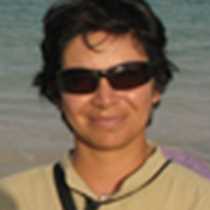North Seymour & Santiago Islands
This morning we went ashore to explore the island of North Seymour. This is the home of both species of frigate birds that nest in the Galápagos. We found both great and magnificent frigate birds. This is also the beginning of the mating season for great frigate birds. The magnificent frigate birds don’t have a fixed mating season; one can always find one or two males with their bright red sacs fully inflated, and showing off for potential mates.
Along the trail this morning we encountered a large number of Galápagos land iguanas, many females but not so many males; most of the iguanas were looking for food and were very active, some even approached us and didn’t seem to be concerned at all by our presence.
As the morning started to get a bit warm, we returned aboard and headed out again for snorkeling. The water is nice and warm this time of the year, and the number and variety of species of fish remains the same throughout the year. For those who did not want to snorkel in deep water, we had a Zodiac ride along the coast of North Seymour, where we observed many Galápagos sea lions and Galápagos fur seals, some actively playing in the water and others resting on the shore.
We returned to the ship and began to navigate to the island of Santiago, where we went for a walk on Sullivan Bay; this place has an immense lava flow from the late 1800’s. This lava flow is so well preserved that the lava looks black and has little plant life. During that volcanic eruption there were trees growing on an ancient lava flow that fell down on the new hot lava, leaving the shape of the trees on the rocks. Several other volcanic formations were seen here, and the vastness of the lava flow made us think about how life colonizes places like this that are so hostile and arid.
Today we also experienced one of the first rains of the season, which is a great thing for all those species of plants and animals that need fresh water to survive and have made it all the way to this moment; now they can reproduce and rejoice in the abundance of food and water.




